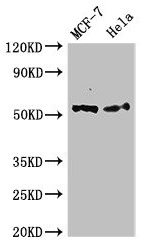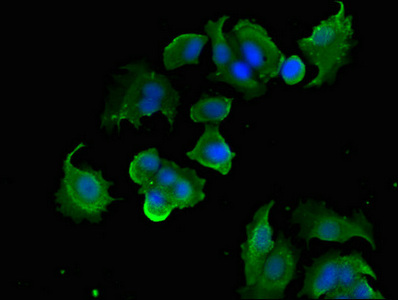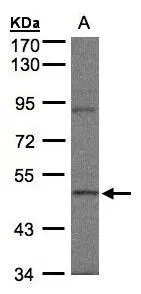
Western Blot Positive WB detected in: MCF-7 whole cell lysate, Hela whole cell lysate All lanes: PTK6 antibody at 2.4microg/ml Secondary Goat polyclonal to rabbit IgG at 1/50000 dilution Predicted band size: 52, 15 kDa Observed band size: 52 kDa
PTK6 Antibody
CSB-PA614448LA01HU
ApplicationsImmunoFluorescence, Western Blot, ELISA
Product group Antibodies
ReactivityHuman
TargetPTK6
Overview
- SupplierCusabio
- Product NamePTK6 Antibody
- Delivery Days Customer20
- ApplicationsImmunoFluorescence, Western Blot, ELISA
- CertificationResearch Use Only
- ClonalityPolyclonal
- ConjugateUnconjugated
- Gene ID5753
- Target namePTK6
- Target descriptionprotein tyrosine kinase 6
- Target synonymsBRK, protein-tyrosine kinase 6, PTK6 protein tyrosine kinase 6, breast tumor kinase, protein-tyrosine kinase BRK, tyrosine-protein kinase BRK
- HostRabbit
- IsotypeIgG
- Protein IDQ13882
- Protein NameProtein-tyrosine kinase 6
- Scientific DescriptionNon-receptor tyrosine-protein kinase implicated in the regulation of a variety of signaling pathways that control the differentiation and maintenance of normal epithelia, as well as tumor growth. Function seems to be context dependent and differ depending on cell type, as well as its intracellular localization. A number of potential nuclear and cytoplasmic substrates have been identified. These include the RNA-binding proteins: KHDRBS1/SAM68, KHDRBS2/SLM1, KHDRBS3/SLM2 and SFPQ/PSF; transcription factors: STAT3 and STAT5A/B and a variety of signaling molecules: ARHGAP35/p190RhoGAP, PXN/paxillin, BTK/ATK, STAP2/BKS. Associates also with a variety of proteins that are likely upstream of PTK6 in various signaling pathways, or for which PTK6 may play an adapter-like role. These proteins include ADAM15, EGFR, ERBB2, ERBB3 and IRS4. In normal or non-tumorigenic tissues, PTK6 promotes cellular differentiation and apoptosis. In tumors PTK6 contributes to cancer progression by sensitizing cells to mitogenic signals and enhancing proliferation, anchorage-independent survival and migration/invasion. Association with EGFR, ERBB2, ERBB3 may contribute to mammary tumor development and growth through enhancement of EGF-induced signaling via BTK/AKT and PI3 kinase. Contributes to migration and proliferation by contributing to EGF-mediated phosphorylation of ARHGAP35/p190RhoGAP, which promotes association with RASA1/p120RasGAP, inactivating RhoA while activating RAS. EGF stimulation resulted in phosphorylation of PNX/Paxillin by PTK6 and activation of RAC1 via CRK/CrKII, thereby promoting migration and invasion. PTK6 activates STAT3 and STAT5B to promote proliferation. Nuclear PTK6 may be important for regulating growth in normal epithelia, while cytoplasmic PTK6 might activate oncogenic signaling pathways.
- ReactivityHuman
- Storage Instruction-20°C or -80°C
- UNSPSC41116161






